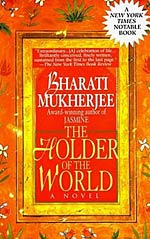
![]() ParallelWorlds
ParallelWorlds
12/31/2013
![]()
Intended Audience: Adult
Sexual content: Significant
Ace/Genderqueer characters: None
Rating: R for gory violence and brief sexuality
Writing style: 2/5
Likable characters: 2/5
Plot/Concepts: 3/5
Beigh Masters is an assets researcher, obsessed with the life of the Salem Bibi, a Puritan woman named Hannah Easton who played a part in a great battle with the Muslim Emperor, the Holder of the World. Through the research of her partner Venn, information can reconstruct certain moments in time. Beigh hopes that all she's pieced together will be enough to recreate one brief moment of the Salem Bibi's life.
Although this book is technically science fiction due to the inclusion of time reconstruction, we spend so little time exploring Beigh's character that the story feels much more like historical fiction. She just happens to be a narrator with a name. In fact, reading this novel felt a bit like reading a textbook, and I'm pretty sure that's the main reason I found it so excruciatingly boring. The ideas and concepts were fine, and even the characters had potential, but there was so much telling and summarizing rather than showing and experiencing that I was constantly catching myself, forgetting that I was reading a novel rather than an academic article. I never really got to connect with any person, place, or event. I felt like I was watching all this through the wrong end of a telescope—rather than being larger than life, everything was distant and unreal. This could have easily been remedied by creating more moments of actual dialogue and interactions between the characters, described with more immediacy.
The other side of this problem, however, is the fact that perhaps this dry informational style was what the author intended. If this really is a story more about Beigh than Hannah, we are more fully transported into her scholarly mindset by reading all of this as if we were some professional historian scanning her work for validity. Venn's project is all about drawing a surplus of information together into something coherent, real, and alive. Beigh is trying to do that in her own way, but struggles to make it real for those she is narrating to. Perhaps the true meaning of the story lies somewhere in that contradiction, but I didn't care enough to look too deeply.
Mukherjee seems to rely on exoticism to sell the story—look, here is a tale about a sexually repressed Puritan woman from Salem, Massachusetts, who because of her witch-like healing powers eventually winds up playing the foreign lover to great and powerful men in India, and becoming the temporary guardian of a fabled jewel. This is the stuff of legends, for sure, but there was nothing to make it meaningful to me. The religious themes were glossed over, the conflicts of identity only briefly touched upon. The dramatic moments were all gore and violence and wild passionate lust (more of the former than the latter). Although Hannah turns out to have a strong personality in some ways, she also doesn't seem to have much of a sense of self—her circumstances shape her more than any decision she personally makes. Fate tosses her to and fro and all she does is accept what happens. The changes which come upon her feel forced and not truly stemming from her own heart.
Again, I could be missing some cultural cue here. Perhaps there is a deeper meaning embedded in the text which I lack the context to see; perhaps I am blinded by my expectations of what makes a good story according to a western model. I'd be happy to hear a well-thought-out opposition to my opinion on this book. Until then, all I can see is a novel which was written without much consideration for the reader; rather, it is simply a collection of ideas put down in a long explanation rather than anything meant to move, inspire, or even entertain.